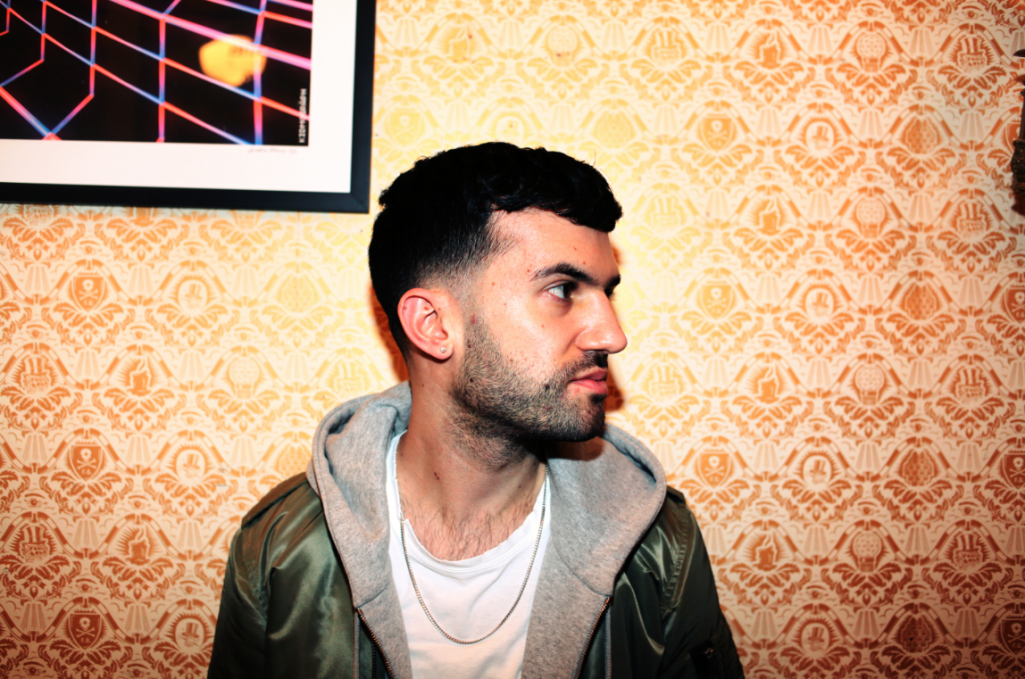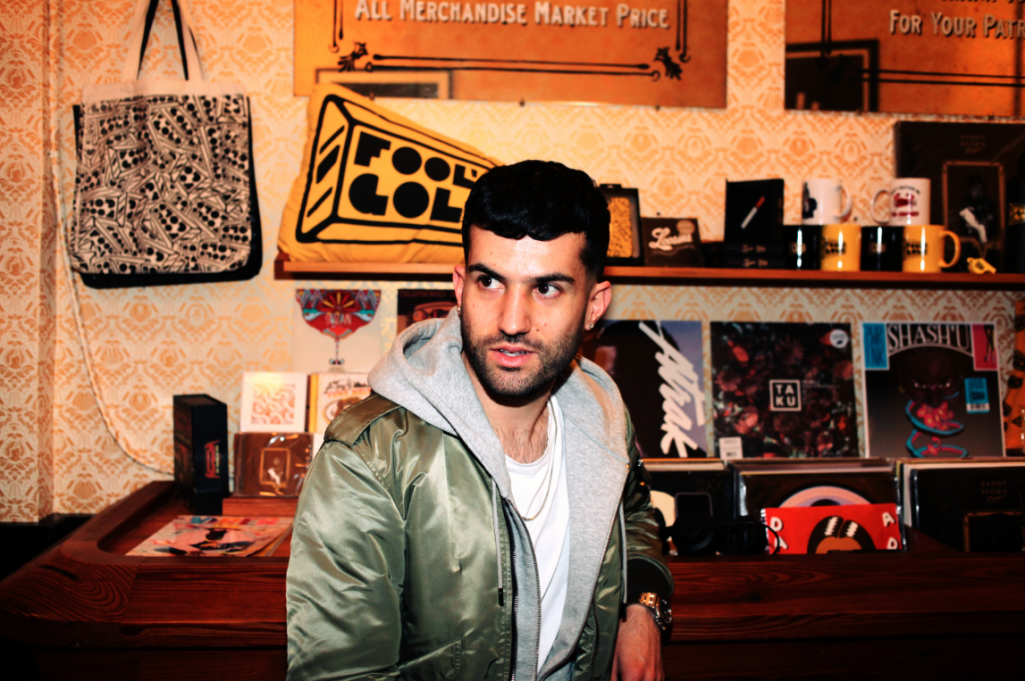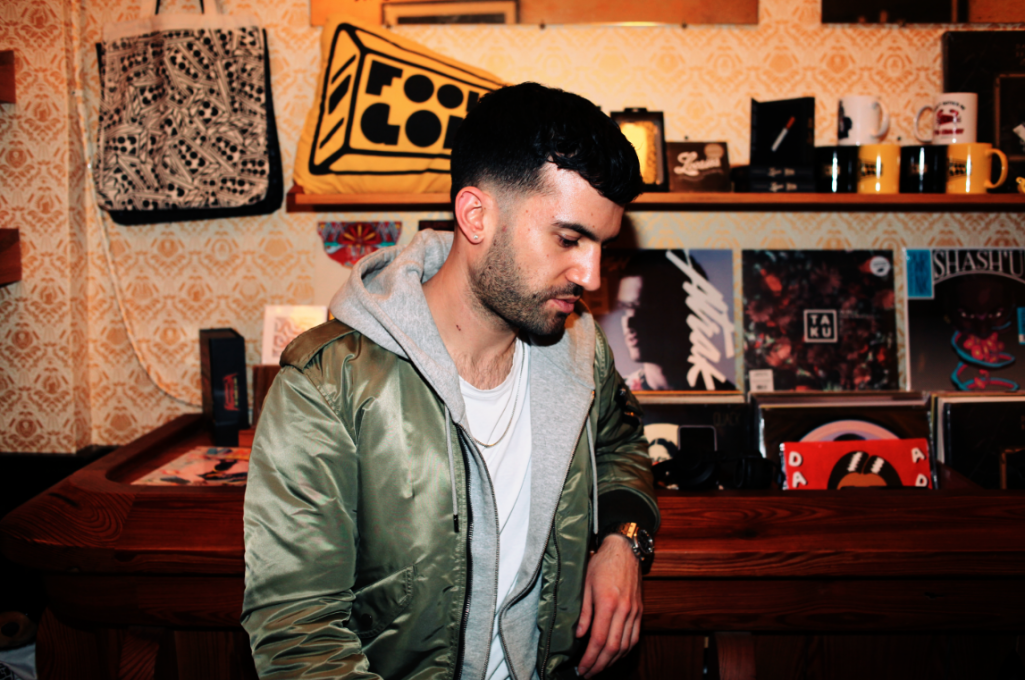Considered a visionary by many Alain Macklovitch, aka A-Trak, is one of music’s most innovative creators. He embodies what it is to be a true DJ/producer with countless DMC turntablist awards and represents how the industry will continue to push forward musically. Deeply rooted in hip-hop, specifically the art of scratching, his lineage of music – Kanye West’s tour DJ during the ‘College Dropout’ days, half of Duck Sauce – is reflective in every sound he creates. It also helps that music seems to run in the family…
Interview by Mike Greene
Photography by Mike Greene and Lauren Engel
“I think in the arts there’s always a combination of born with it predisposition, mixed with contextual stuff like time and place, it’s about putting in work.”
Mike: Was there something in the Canadian water that would cause for both you and your brother to be involved with the music scene, and see the success you have? Was it something you feel you were born with? It’s interested to see the height of which you both have exceeded.
A-Trak: Canada is very big, so there may be more factors for us being involved with music than just the water… respect to russia because they’re bigger (laughs).
In all honesty, I think in the arts there’s always a combination of born with it predisposition, mixed with contextual stuff like time and place, it’s about putting in work. My brother, Dave (of Chromeo fame), and I always grew up close, I was into whatever he was into since he was the older brother. When I was 9, I’d hang out with him and his friends – they were 13 and were discovering Jimi Hendrix, Zepplin, Pink Floyd, and Frank Zappa, so i’d listen as well. Dave picked up the guitar pretty early on, and I wanted to find my instrument. I tried scratching one day and then there came in that sort of X factor where most people try scratching one day on their dad’s record player and mess up the needle, or the needle skips, or it just sounds like shit. When I tried scratching it sounded okay, and from then on I started practicing every day and just got better.
Mike: Did your family in any way, aside from Dave, factor into the rise of “A-Trak”?
A-Trak: Neither of our parents are musicians but I think they definitely encouraged the arts in some way. I just appreciate my parents for their support and putting us into an environment that probably helped our minds when we were young. Both my parents studied literature, and I don’t think we necessarily did anything out of the ordinary when we were kids – I think that every parent should take their kids to the museum, play a lot of music at the house, and have open conversations about current events regularly, that’s the setting that opens up a kids mind and that’s the setting that we grew up in. Dave and I had a passion for music, and maybe we kind of fueled each other because we definitely influenced each other.
Mike: When did Dave pick up the guitar?
A-Trak: He found the guitar as his instrument early on, I think when he was 9. Our grandma got him guitar lessons, as a Hanukkah or Birthday present, and he stuck with it for years.
Mike: Did your grandma provide that creative outlet? Was she the one who started all of this?
A-Trak: I’m not sure honestly, I was even younger at that time. I don’t remember the background of that present, or who’s idea it was, but he found the guitar early on. I played the piano for a few years but i wasn’t very good… I was okay. I feel like i was playing the piano and my eyes were looking out the window, I wanted to do something else. I tried scratching and i figured out the possibilities and the fact you could grab any sample on a turntable – you could grab a sample of a trumpet and you’d essentially become a trumpet player, you’d grab a vocal sample and you’d become like a vocalist. There’s a limitless end to what you could do with records and my mind exploded.
Mike: Especially back when it wasn’t as easy to just download samples off the internet, not everything was as accessible as it is today.
A-Trak: I’m sure I would have been happier with easier access, that was the tough part about growing up in Montreal granted it wasn’t actually tough, but i definitely had to dig a little deeper to understand information like “what the hell does a DJ actually do” – I was 13, what did I know.
Everyone talks about how EDM is a newer thing and electronic music only broke out in the last 4 years or so, and for the most part that’s true
Mike: How was the underground scene in Montreal?
A-Trak: It was dope! Montreal is like a crossroads type of city and because everyone speaks french, the hip-hop scene exists in two languages. There’s a french rap scene, there’s an english rap scene, there’s neighborhoods separating, and that in itself makes it pretty complex. There’s influence of Europe from people making french rap and listening to rap from france, you had acts coming in to perform from overseas and then you had the american influence and english-canadian speaking influence as well. There were really good second hand record shops, a good nightlife scene, and a good university scene – there’s a bunch of youth, which makes for a fertile ground for creativity. Anybody that visits Montreal is like “oh shit, this is different”. It’s almost like New Orleans to me, the city is just so vibrant. You walk through and it’s like sensory overload.
Mike: I was going to say, since Canada is on middle ground it has both the european aspect of the electronic craze, and on the other side in America there was the hip-hop craze. It’s the best of both worlds.
A-Trak: Everyone talks about how EDM is a newer thing and electronic music only broke out in the last 4 years or so, and for the most part that’s true. In Montreal however, we had techno clubs and house music – we had all that stuff but I wasn’t into it. I didn’t give a shit about electronic music until 2005 – I was a hip-hop head, but It [electronic music] was there and I kinda knew it.
Mike: Were there any musicians from your childhood that you, your parents, or your brother, listened to that affected how you created, or create today? Any one particular group or artist that had a lasting influence on you?
A-Trak: In the beginning there were a couple of guys. See i got into scratching around ‘95 so it was a combination of Pete Rock and DJ Premier, cause I’d hear scratching on their records and they were the kings of current hip-hop at that time. It was a little bit of Jazzy Jeff, though his music was a little bit older everyone knew who he was – he was so dope and he influenced me for a long time. I then discovered Qbert and some of the really advanced scratch guys and that combination in the early years when i was really learning hip hop DJ scratching
“You’ve gotta figure out what makes you you, and put that into your art… you’ve gotta figure out what your identity is.”
Mike: Was there anyone local that you had competited with or scratched with?
A-Trak: My brother used to have a college radio show during the time of the the 96’ DMC competition, which is the year before I entered. At that point I had just been scratching in the bedroom maybe 6 months, definitely less than a year. My brother had invited two of the top 3 DJs from the Montreal battle and told me to come along, like “Yo you gotta come meet these guys, these are the guys you’re trying to be like”. There was DJ Devious, a local Montreal DJ who had placed 3rd in the battle and he’d become really helpful. He was almost 10 years older than me, when I was 14, but we would link up and jam and he would show me certain things. He had a mixer that was better than mine; he had all the DMC mixtapes; he had footage of DJs who had come through to Montreal for a show, taken on his little handy cam – to me that was cool. There was also Kid Koala who is still known and a great DJ. He was another mentor who I’d stayed in touch with for years and taught me a bunch of stuff. You know, I was 14 at the time meeting some of the best DJs in the city and I was really lucky in the early years because they all took me under the wing. Although I learned everything by myself it was really by the Osmosis of being there that I picked up on somethings, and honestly even on an outlook on life. It was the fact that all of those guys were cool with me rather than knocking me down, the fact that they were welcoming was huge to me and I think of that to this day. I’m at the part of my life where that’s important. I’m 33 and I’ve been DJing for 20 years. I think about that and how when I was coming up, those guys were my idols and I met them, like how did that affect and encourage me. It was so positive so now it’s my duty to give that back to people now.
Mike: Has there been anyone you’ve met that’s taught you something about yourself, or helped you realize?
A-Trak: Yeah I’m sure in different ways, but here’s the thing – I always tell people who ask about advice for up and comers that you’ve gotta figure out what makes you you, and put that into your art because there are just too many DJs out there. You’ve gotta figure out what your identity is. I became friends with this guy Peanut Butter Wolf when I was about 15.
Mike: Great choice for a name!
A-Trak: Yeah, he’s great! He runs Stones Throw records, a hip-hop label that put out the ‘Madvillians’ stuff (a collaboration between producer Madlib and MF DOOM) – it’s really one of the best labels, and he’s also a great DJ. When I was 15, maybe 16 and I met this dude – he was about 10 years older than me and lived in San Fran at the time. When I’d go there and stay at his crib he had this great record collection and he’d show me all these samples like, “hey, this is the record DJ Premier sampled on ‘Group Home’ or this is the funny electro breakdancing group that Dr.Dre was in (World Class Wreckin’ Cru) before he did gangster rap, like here he is wearing spandex. Sidebar, there’s a documentary on Stones Throw out now that everybody should watch. The movie shows Peanut Butter Wolf has an off-beat personality, he’s a weirdo but an awesome dude and I think guys like him helped me tap into my inner weirdo in a sense too. I think that’s really awesome and necessary because when you accept the parts of your personality that are different and inevitably put that into your music based on comfort – maybe your artwork is a little bit funnier or maybe you make a song with more character – that’s so important, and I would credit him for helping me tap into the goof ball within me and reflecting that within my work.
“It probably says that I’m a little indecisive since I make so many types of music”
Mike: How did that evolve into Obscure Disorder with you and your brother?
A-Trak: Obscure Disorder was pretty simple. Dave started producing with these 3 local Montreal guys who he went to high-school with and I de-facto became the DJ. That was a huge part of the come up for me and Dave because we figured out part of the blueprint from that. We started our first record label Audio Research to put out the records and then we got a distribution deal with Fat Beatz which was the illest way to put out underground hip hop at the time. It helped us develop this entrepreneurship that I didn’t think we had and helped us develop this ‘we can do anything we put our minds to mentality’. I don’t mean to sound like the back of a hallmark card but it’s true, and it’s even more true now that the internet is so accessible. That DIY approach of creating and releasing your own music, that’s in my DNA and it’s what i’ve done ever since I started with that project.
Mike: An artist’s music is typically a reflection of themselves in one form or another, what does your music say about you?
A-Trak: Hm, what does my music say about me… It probably says that I’m a little indecisive since i make so many types of music, like you don’t want to ask me to pick a restaurant.
Mike: I mean more like, going back to the ‘dirty south days’ to the release of ‘we all fall down’ you’ve come from such a lineage of refinage to where you are now.
A-Trak: I think the lineage of my music from all those years is because I like cross-pollination and the hybrid art projects. I like something that’s more than one thing and a lot of the music I make has mixed influences, you know the characteristics of my ear and by extension my personality are the combining attributes. You can listen to ‘Piss Test’ which is a rap song I did with Juicy J and Danny Brown or you can listen to a remix i did for Alesso, and on paper it looks like it’s from different worlds but when you listen to it you’re like ‘yeah this is the same guy’ because there are the little idiosyncrasies that tie it together.
Mike: Almost like they all stem from the root of the tree and grow into something bigger.
A-Trak: Exactly!
Mike: So you’ve come to be known as a visionary in the industry with you transformations of sound. In an interview you recently did with Hot ‘97 you mentioned that Yung Thug was the “next sound”. Where do you think we’ll go next?
A-Trak: Take a look at the upcoming releases on fool’s gold and see what we’ve got. That’s how we sign shit. In the more general sense something that’s been occurring has been the breakdown of genre barriers. The sounds are mixing up and I think the big mainstream EDM sound is breaking down; I think the sonics of electronic music are going into everything around it. You have future sounding pop with a big sense of melody. A lot of songs now are very melodic and very open sounding, it’s not condensed. House is really popular and I think at the same time there’s a lot of creativity in rap.
Mike: How do you feel about bridging the gap between the two?
A-Trak: I think it’s already happening. There’s a lot of production in hip-hop that sounds really adventurous, like rap kinda broke free from the traditionalist tropes. A lot of the most daring and weird sounding rap beats are made from 20 somethings in atlanta, and I go and work with those guys. Project Low Pro that i did with Lex Luger and a lot of other producers was a really cool experience of me heading down to the studios in the south and calling up Metro D and Sonny Digital, letting them know I’m around and to come through so we can make beats together. Those guys aren’t slowed down by the idea that there are rules of what they can and can’t do because for a long time hip hop was governed by really rigid rules – you couldn’t wear pants that were tighter than this, you couldn’t talk about insecurities, your drums had to be sampled from a year break of 1960-1972 – you know what i mean it was just so rigid! Now, anything goes and being a weirdo is a cool thing, in part thanks to guys like Kid Cudi, and being creative is a cool thing.
Mike: What’s something you’ve learned from collaborating with so many individuals, from Daft Punk to Kanye?
A-Trak: Hm, that’s a good question! I’d say what i learned from collaborating so much is that everyone has something to offer. There’s something about making much with someone that the first time you try it, it can be testing to your own confidence because none of us know how to do everything in the studio. There’s this idea nowadays, surrounding the whole controversy of “ghost producers” and the kind of naive perception that every producer is supposed to create the alpha to omega of a song and if a songwriter credited on your song you have some explaining to do. That’s not really true and I’m not saying everyone should accept those producers but I think everyone should be credited. To go back to my original point, I was saying if you make music and you think about making music with someone, it’s a bit intimidating because what if i get to that hurdle where I’m trying to create the chords but I can’t really come up with them and I realize I’m not that good at making chords. The reality of working with someone is all about tapping into the strengths and weaknesses and making the most out of that, and accepting your weaknesses for what they are. Being like “hey by the way, I dont have the best chord theory but my drums are sick’, By collaborating you’re able to cover the grounds and bring out the best in each other. That’s what awesome to me about collaboration Mike: I look at it as an art canvas where everyone is throwing their paint and you don’t quite know how it’ll come out but you know it’ll work.
A-Trak: It’s funny because for producers/DJs it’s literally a matter of sitting at a laptop passing over the chair. You sit for 30 minutes and program your high-hats and then you pass over and ask, “what do you hear”. Other times it’s giving ideas, references, and humming stuff. A big part of creating, whether a song or any form of art, is the idea of knowing when it’s done. Working on Duck Sauce with Armand Van Helden, a big part of his gift is his awesome sense of being able to say “hey, this is it”. Anybody that makes a beat knows there’s a part in the process where you have 3 different drum patterns or 3 versions of something, and he’s the guy that will go, “no no, this is the one”, and I’ll respond, “you sure?” We’ll work on a whole song and I’ll mention, “what if we add this, or that” and he’ll just come in and be like” nah this song is done”. It’ll sit me down for a second and I’ll think to myself, “is this it?, and inevitably he’s right. There’s a point after a while where you can internalize that sensor.
Mike: It honestly like seems everyone needs an Armand in their life in that case.
A-Trak: (laughs) you’re right!














